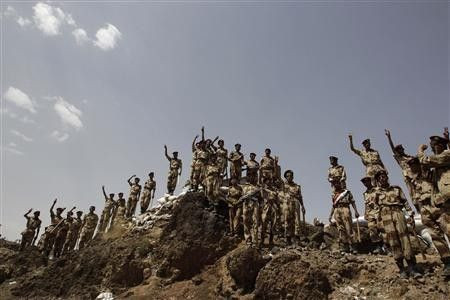Deaths Mount as Army Factions Clash in Yemen

A rocket attack on a protest camp in Yemen's capital Sanaa Tuesday raised the death toll to at least 58 in some of the deadliest violence to hit the country in eight months of pro-democracy demonstrations.
Heavy shelling and machinegun fire rocked the city before dawn as the violence shifted from a crackdown on protesters to a military confrontation between troops loyal to President Ali Abdullah Saleh and soldiers who have defected to the opposition.
Witnesses told Reuters at least three missiles struck the camp just after morning prayers around 5 a.m. local time.
The rockets hit some men walking outside past a market. I have two dead, said Dr. Mohammed al-Qubati, director of a field hospital at the protest camp on a site which the protesters have nicknamed Change Square. He said 10 had been wounded.
We were walking back from prayers. All of a sudden a rocket hit close by from out of nowhere, and some people fell down. And then a second one came and that's when we saw the two martyred, Manea al-Matari, a protest organizer, told Reuters by phone.
More than 400 people have been killed since protests began in January, and world powers fear chaos in Yemen, home to al-Qaida in the Arabian Peninsula and bordering biggest oil exporter Saudi Arabia, would raise risks for world oil supplies.
Yemen was an ungovernable state four years ago and it continues to be an ungovernable state, Theodore Karasik, security analyst at Dubai-based INEGMA, told Reuters.
It's the worst possible scenario at the worst possible time for security in the south of the Arabian Peninsula.
At least 56 people were killed on Sunday and Monday, said doctors and witnesses, after demonstrators demanding an end to Saleh's 33-year rule ratcheted up their protests.
Government forces responded to the demonstrations with heavy fire, while snipers shot at activists from rooftops, Reuters journalists said.
Opposition forces loyal to Gen. Ali Mohsen clashed with government troops on Monday, though it was unclear who started the fighting. Mohsen, a top Yemeni general, dealt a major blow to Saleh's regime when he and his troops defected following an earlier crackdown in March which killed 52 people.
No one from the government was immediately available to comment on the reports. Officials said on Monday that government soldiers were not targeting protesters and blamed the bloodshed on the opposition.
A witness close to the protest camp said Yemen's Republican Guard forces had taken up a position on a mountain on Tuesday and started shelling Mohsen's First Armoured Division base in the city. The camp may have been hit by stray shells, he said.
WORST CASE SCENARIO
Diplomats, struggling for months to help the opposition and government reach a political deal, have feared rising tensions in the capital of the impoverished Arabian Peninsula state could deteriorate into a full military confrontation.
Diplomats and Yemeni politicians scrambled on Monday to speed up a long-stalled transition plan under which Saleh, recovering in neighboring Saudi Arabia from a June assassination attempt, would step down.
A source in Yemen's political opposition said members were meeting government officials and diplomats to try to push through a deal. U.N. mediator Jamal bin Omar and Gulf Cooperation Council Secretary General Abdbullatif al-Zayani arrived in Sanaa on Monday and were expected to join the talks.
Zayani was expected to press for the signing of a Gulf-brokered transition plan which Saleh backed out of three times before.
There's a possibility of trying to push through the Gulf plan for signing this week, an opposition source said.
Protesters vowed to march again on Tuesday to condemn the crackdown and lack of international response.
Several countries including the United States condemned the violence but gave little indication of how they planned to put pressure on Saleh.
The United States regrets the deaths and injuries of many people during protest marches in Sanaa yesterday. In this tense situation, we call upon all parties to exercise restraint, the U.S. embassy in Sanaa said on Monday.
The shelling on Tuesday, which initially centered on Mohsen's base, spread to a wealthier neighborhood in the city later. A Reuters witness heard the crack of loud explosions in Hadda, where several leading members of the powerful al-Ahmar tribe have homes guarded by armed tribesmen who have clashed with the government in recent days.
The Ahmar family threw its weight behind the protesters several months ago. It was unclear who started the fighting in Hadda on Tuesday.
(Editing by Andrew Heavens and Reed Stevenson)





















